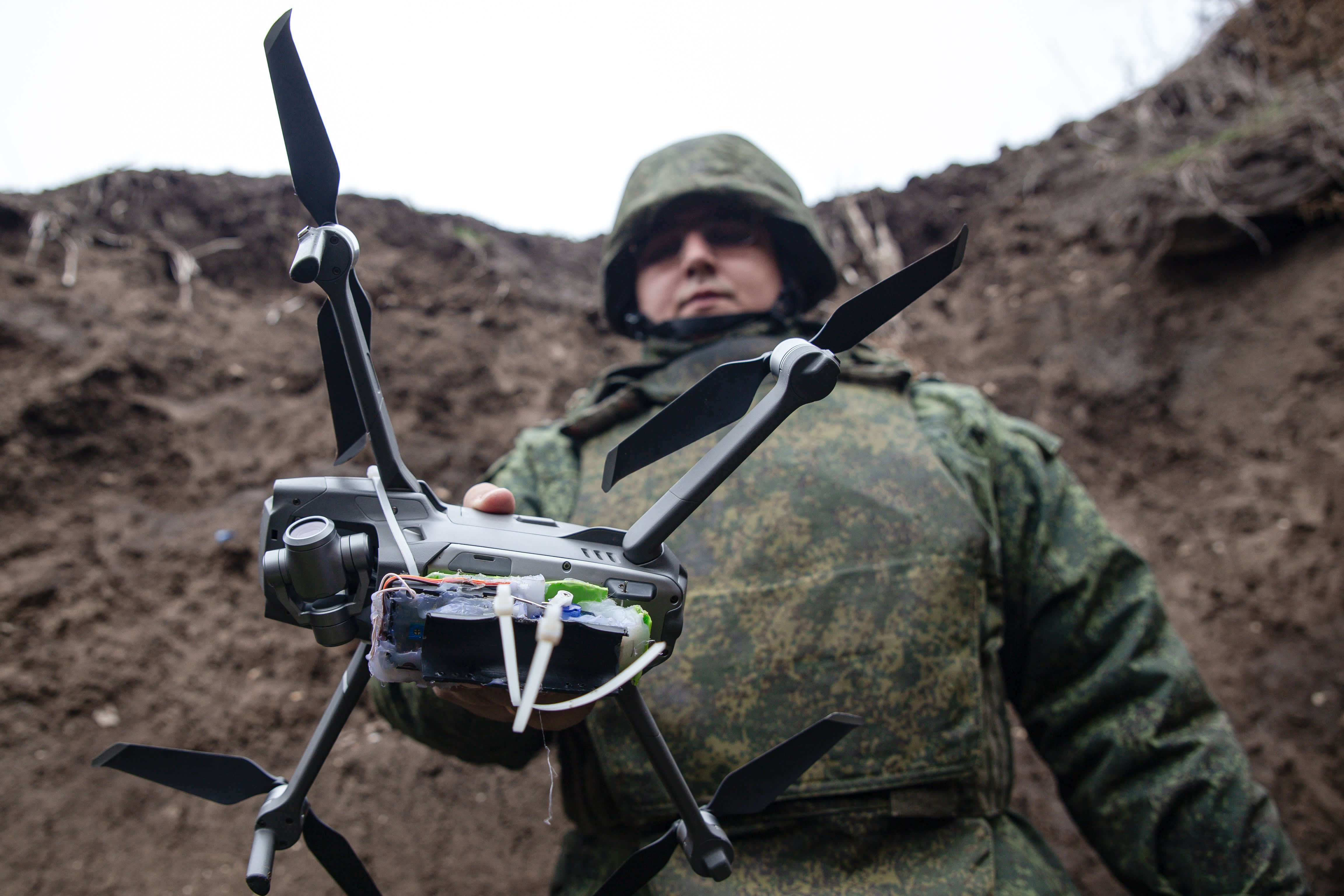
Representative of the People’s Police of the Lugansk People’s Republic shows a seized home-made strike drone equipped with a grenade launcher which was used by Ukrainian government troops, near Slavyanoserbsk, east Ukraine.
Alexander Reka | TASS | Getty Images
WASHINGTON – The State Department recommended Sunday that all U.S. citizens in Ukraine depart the country immediately, citing Russia’s extraordinary military buildup on the border.
“Our recommendation to U.S. citizens currently in Ukraine is that they should consider departing now using commercial or privately available transportation options,” a senior State Department official said Sunday evening on a call with reporters.
For months, the West has watched an extraordinary deployment of Russian forces and equipment to its border with Ukraine.
The buildup has evoked Russia’s 2014 annexation of Crimea, a peninsula on the Black Sea, which sparked an international uproar and triggered a series of sanctions against Moscow. The seizure of Crimea also saw Russia’s removal from the Group of 8, or G-8, referring to the eight major global economies.
“The security conditions, particularly along Ukraine’s border and in Russian-occupied Crimea and in Russia-controlled eastern Ukraine are unpredictable and can deteriorate with little notice,” added the official, who spoke on the condition of anonymity in order to share details.
A second senior State Department official said they were not unable to provide the exact number of U.S. citizens residing or currently traveling in Ukraine.
“U.S. citizens are not required to register their travel to a foreign country and we do not maintain a comprehensive list,” explained the official.
The State Department also ordered eligible family members of personnel at its embassy in Kyiv to leave the country due to the deteriorating security conditions.
U.S. Secretary of State Antony Blinken and Russian Foreign Minister Sergei Lavrov move to their seats before their meeting, in Geneva, Switzerland, January 21, 2022.
Russian Foreign Ministry | via Reuters
The latest revelation comes less than two days after face-to-face talks between Moscow and Washington.
Secretary of State Antony Blinken told his Russian counterpart on Friday that the Kremlin could defuse tensions and concerns about a potential invasion by removing a deployment of 100,000 troops and equipment away from Ukraine’s borders.
The meeting between Blinken and Russian Foreign Minister Sergey Lavrov came as Western officials, including President Joe Biden, have said they expect Moscow to launch an incursion into Ukraine. U.S. intelligence has indicated Russia could attack within a month’s time.
The U.S. is not convinced of Russia’s claim that it is not preparing for an invasion of its ex-Soviet neighbor, Blinken said.
“If Russia wants to begin to convince the world that it has no aggressive intent toward Ukraine, a very good place to start would be by de-escalating by bringing back and removing these forces from Ukraine’s borders,” Blinken told reporters following a 90-minute meeting with Lavrov in Geneva.
“We and all of our allies and partners are equally committed to making sure we are doing everything possible to make clear to Russia that there will be a swift, severe and united response to any form of aggression by Russia directed to Ukraine,” Blinken added.
Meanwhile, Russian officials have repeatedly called on the U.S. to prevent an eastward expansion of NATO, the world’s most powerful military alliance.
Russia has also demanded that the U.S. “shall not establish military bases” in the territories of any former Soviet states that are not already members of NATO, or “use their infrastructure for any military activities or develop bilateral military cooperation with them.”
Since 2002, Ukraine has sought entry into NATO, where the group’s Article 5 clause states that an attack on one member country is considered an attack on all of them.
When asked about those demands on Friday, Blinken said the U.S., as well as the NATO alliance, would not negotiate the terms of member entry with the Kremlin.
“We need ironclad, waterproof, bulletproof, legally binding guarantees. Not assurances, not safeguards, but guarantees,” Russian Deputy Foreign Minister Sergei Ryabkov told reporters during a Jan. 10 press conference.




